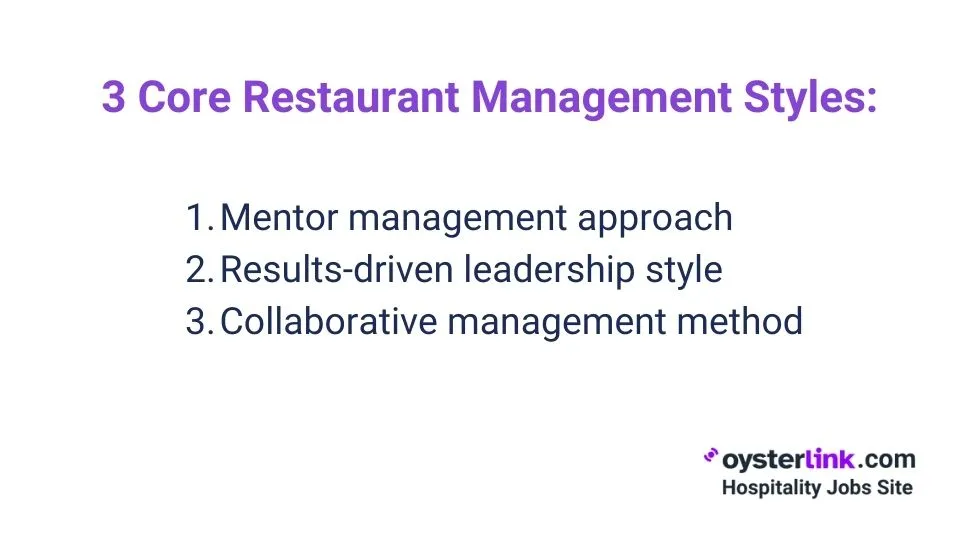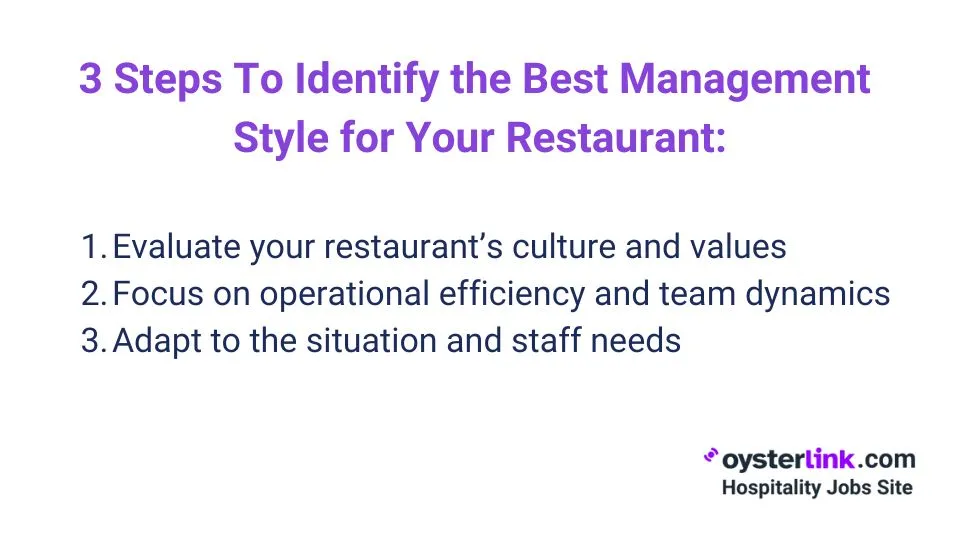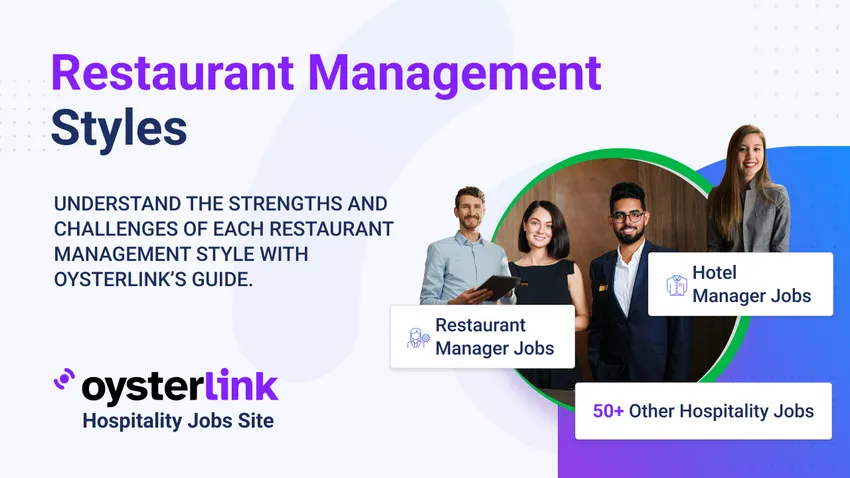As a new leader in the restaurant industry, understanding your management style is crucial for building a successful team and business.
Effective restaurant management goes beyond handling day-to-day tasks — it’s about creating an environment where employees feel valued and supported.
Your leadership style shapes the restaurant’s culture and guest experience, whether you're managing a busy kitchen or guiding the front-of-house team.
In this guide, we’ll explore key restaurant management styles, offer tips for adapting your approach and provide strategies for overcoming common challenges.
Understanding Modern Restaurant Management Styles
Modern restaurant management has moved beyond the old command-and-control style.
Research shows that 46% of employees who quit restaurants blame difficult Managers. This points to how vital good leadership is.
Traditional vs contemporary management approaches
In the past, restaurant Managers often leaned on an autocratic style, making decisions without much input from their team.
This top-down approach kept things controlled but sometimes left employees feeling disconnected.
Today, successful restaurants embrace more collaborative management styles that encourage staff participation in decision-making.
By involving employees, Managers foster a sense of ownership and teamwork, creating a more supportive and productive work environment.
Modern management styles also emphasize open communication. Managers who share updates about daily operations and goals with their staff build stronger, more unified teams.
This transparency helps everyone stay aligned and motivated, making day-to-day challenges easier to tackle.
Impact of management style on restaurant success
How a restaurant is managed affects everything — from how the staff feels about their jobs to the quality of service customers receive.
A great management style builds trust, encourages creativity and keeps the team motivated, even during the busiest shifts.
On the flip side, poor leadership can cause high turnover, low morale and service that feels inconsistent.
When Managers focus on collaboration, clear communication and mutual respect, the results speak for themselves.
Teams are happier, work more smoothly together and deliver better experiences for guests — and that’s what drives a restaurant’s success.
Key qualities of effective Restaurant Managers
The best Restaurant Managers have several key traits that set them apart:
- Strong communication skills: They clearly guide both front-of-house and kitchen teams, ensuring everyone stays on the same page.
- Excellent organization: From tracking employee records to managing inventory, they stay on top of every detail to keep operations running smoothly.
- Stress management: With long hours and fast-paced environments, they remain calm under pressure and lead by example.
- Resilience and adaptability: Food Service Managers often work 12 to 15-hour days, making flexibility and the ability to handle unexpected challenges essential.
- Commitment to quality: They prioritize maintaining high standards for food, service and overall guest experiences.
Core Restaurant Management Styles Explained
Your restaurant’s success relies heavily on choosing a leadership style that works for your team and the unique challenges of your business.
Effective management creates an environment where employees feel supported, motivated and more likely to stick around, helping the entire operation run smoothly.

1. The mentor management approach
The mentor management style focuses on developing employees for long-term growth.
Restaurant Managers who embrace this approach guide their team members through career progression, creating an environment where mistakes are treated as opportunities to learn and improve.
Mentorship benefits both employees and Managers. Employees often feel more valued and motivated, leading to increased loyalty and retention.
For Managers, mentoring can enhance leadership skills and foster a more engaged team.
This style is particularly effective in restaurants with high turnover, as mentored employees are more likely to stay committed to their workplace.
2. The results-driven leadership style
Results-driven leaders prioritize clear goals and measurable outcomes.
They track performance metrics and hold their teams accountable, making smart, data-informed decisions to enhance efficiency and profitability.
This leadership style strikes a balance between achieving quick wins and focusing on long-term success.
Managers create reliable systems to measure progress, ensuring that their teams understand expectations and feel motivated to meet shared goals.
Open communication about performance and results keeps everyone aligned and engaged.
3. The collaborative management method
The collaborative approach bridges the gap between front-of-house and back-of-house teams, encouraging staff to work together toward shared goals.
Employees are actively involved in decision-making, with team meetings fostering open dialogue and mutual accountability.
Collaboration sparks creativity and innovation, as it brings together different perspectives to solve problems and improve operations.
By involving all departments in discussions and decisions, Managers ensure that solutions are practical and work for everyone, leading to a more unified and efficient team.
Choosing the Right Management Style for Your Restaurant
Restaurant owners must evaluate their establishment's unique characteristics to determine the most effective leadership approach.
Factors like team structure, customer expectations and operational goals all play a role in shaping the management style that will drive success.
To determine the best management style for your restaurant, follow these three steps:
- Evaluate your restaurant’s culture and values: Analyze how your staff interacts with customers, from their politeness to how they handle special requests. This reveals deeper organizational patterns and highlights areas to improve.
- Focus on two key areas: Assess operational efficiency and team dynamics. Successful restaurants align their management approach with both short-term needs and long-term business goals while adapting to customer priorities.
- Adapt to the situation and staff needs: Use autocratic leadership during high-pressure moments, like rush hours or emergencies and democratic styles for planning menus or team discussions. Provide hands-on training for new staff while giving experienced employees more independence, fostering a motivated and valued team.

Managing different restaurant teams
Restaurant teams need different management approaches for each department.
From the start, you need to understand how kitchen and service teams work differently to create a unified workplace.
Kitchen staff management techniques
Pre-shift meetings are essential for effective kitchen staff management. These sessions allow Chefs and Kitchen Managers to discuss menu items, special events and service expectations.
Clear communication about daily goals helps prevent confusion and keeps the kitchen running smoothly.
Proper training and mentorship are key to a well-functioning kitchen. Cross-training programs make staff more adaptable and promote better team collaboration.
Kitchen Managers should provide specific, actionable feedback to ensure instructions are clear and minimize mistakes or inconsistencies.
Cross-department coordination
Shared goals between front-of-house and back-of-house teams are key to better cross-department coordination.
When departments align on priorities and communicate effectively, the entire operation runs more smoothly.
For example, the kitchen and service teams must work closely together to ensure smooth service.
Clear communication between Chefs and Servers regarding timing, menu availability and special requests reduces errors and enhances guest satisfaction.
When Chefs notify Servers about low stock or dishes needing extra attention, it ensures orders are managed efficiently and customers are served promptly.
Developing Your Personal Management Style
Successful Restaurant Managers start by understanding their own leadership style.
Recognizing your natural tendencies helps you make smarter decisions about your team and operations.
By reflecting on your core values and behavior patterns, you can lead more effectively and build trust with your team through consistent actions.
One useful step is completing a behavioral assessment to understand how you handle authority, support and decision-making.
This self-awareness enables you to lead with intention and strengthens team trust through your actions, not just promises.
Learning from industry veterans can also be invaluable. Experienced Managers bring unique perspectives on discipline, systems and risk management.
Their success comes from balancing strong operations with genuine care for their teams.
As you gain experience, it’s important to adapt your management style.
The best leaders prioritize emotional intelligence and self-care, knowing that personal well-being directly impacts their leadership effectiveness.
A flexible approach that can be tailored to your team’s needs and different situations will help you achieve the best results.
Consistency is essential, but the ability to adjust is key for long-term success.
Overcoming Common Management Challenges
Running a restaurant comes with its own set of challenges, especially when it comes to managing high-pressure and diverse teams.
Flexibility and quick thinking are essential for handling tough situations.
Whether it's an equipment failure or a surprise staff shortage, high-pressure moments are part of the job.
Great restaurant Managers create strategies to keep things running smoothly even with limited resources.
Managing a diverse team is another challenge that requires thoughtful leadership.
By embracing cultural differences and promoting inclusivity, Managers can create a more harmonious and effective workplace.
Inclusive hiring, sensitivity training and open dialogue help bridge gaps, fostering mutual respect and collaboration.
When team members feel understood and valued, they’re more motivated and engaged, resulting in lower turnover and better service for customers.
Improving Operations With OysterLink Resources
Restaurant management is an evolving skill that requires adaptability, communication and a deep understanding of your team.
The best Restaurant Managers are those who are able to assess their environment, choose the right leadership style and adjust it when necessary.
By developing your personal leadership style, embracing diversity and prioritizing communication, you can lead a team that’s motivated, loyal and ready to tackle any challenge.
If you’re looking for resources to build your team and improve your restaurant’s operations, OysterLink is here to help.










Loading comments...